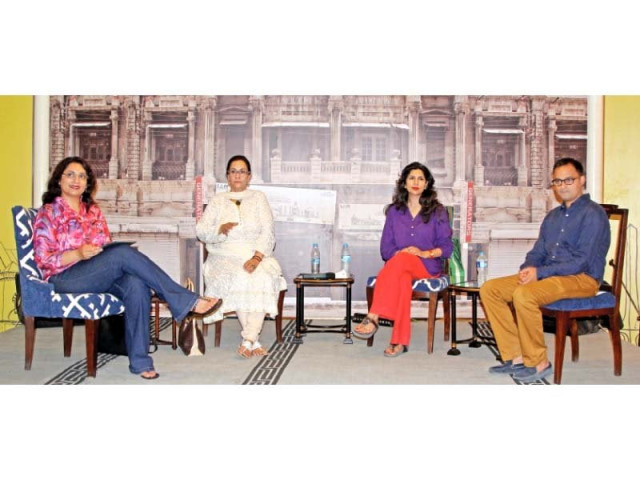Tribute to Qissa Khwani Bazaar: Remembering pop culture and what made Pakistanis proud
Speakers discuss how pop culture shapes national identity and pride.

Speakers at ‘Popular Culture, Identity and Pride — A Tribute to Qissa Khwani Bazaar’ discuss what makes them proud to be a Pakistani on the last day of the Karachi City of Lights Festival. PHOTO: AYSHA SALEEM/EXPRESS
Talking about how pop culture shapes identity, the singer was speaking at 'Popular Culture, Identity and Pride — a Tribute to Qissa Khwani Bazaar', a panel discussion organised by the Citizens Archive of Pakistan on the last day of the Karachi City of Lights Festival on Sunday.
According to Sani, the fact that Pakistanis were losing the part of their identity that came from music was something that the nation had brought upon itself. "Singers such as Mehdi Hasan and Noor Jehan were trained in India; we did not build institutions of our own," she pointed out. "We have a history of pride but we did not plan our future."
The audience, meanwhile, was surprised and delighted when Imran Ali, a certified coach from the British Football Association and a member of the Karachi United Football Foundation, told them that there are 450 football clubs in Karachi - the highest number in any Pakistani city. He pointed out, however, that pop culture cannot be isolated from its capitalistic nature — no sport except cricket can grasp corporate attention. "Football has never received sustained media attention."
For Ali, however, sports are a matter of pride. Nothing, according to him, could compare to the energy felt at Qaddafi stadium when over 20,000 spectators rejoiced cricket's return to Pakistan. "Moments in sports like these transcend whether you come from Lahore or Karachi - they outdo the benefits you receive in billions from the Chinese." On the same note, he said, there was no distinction of ethnicity in the football clubs — whether Baloch, Muhajir or Pathan, the youthful players were all the same on the field.
As the discussion moved towards what constitutes Pakistan's national pride, Sani asserted that Sufism, falling in the domain of both folk and pop culture, could be seen as the nation's collective pride.
Curator Sameera Raja agreed with her, adding that Sufism picked up when the urs at shrines were visited even by educated people. She also highlighted truck art paintings of the white horse, Burraq, and the red-and-green wedding shamiyanas, characteristic of the 1970s before event planners took over, as examples of national pride within the realm of art.
Published in The Express Tribune, June 9th, 2015.



















COMMENTS
Comments are moderated and generally will be posted if they are on-topic and not abusive.
For more information, please see our Comments FAQ